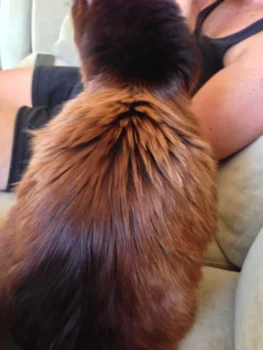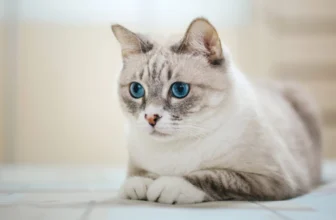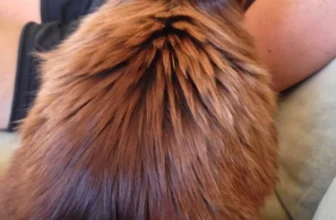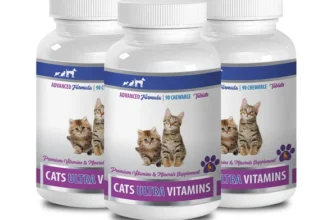As a devoted American Wirehair cat owner, it’s natural to want your feline companion to live a long and healthy life. One crucial aspect of maintaining their health is ensuring they receive the necessary vitamins and minerals they need to thrive. However, with so much information available about cat nutrition, it’s understandable to feel perplexed about where to begin. In this article, we will explore the essential vitamins that American Wirehair cats need, the common deficiencies they may face, and the effects these deficiencies can have on their health. We’ll also provide tips on how to prevent these deficiencies and keep your cat happy and healthy. Let’s dive in!
Understanding Vitamins for Cats
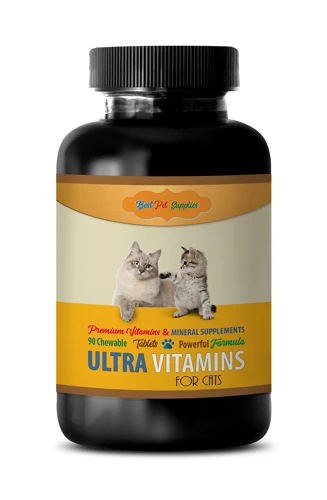
Cats, including American Wirehair cats, require essential vitamins to maintain good health, energy, and overall well-being. Vitamins are organic compounds that act as a catalyst for various biochemical reactions within the body. Without these essential nutrients, cats may experience various health issues and other complications. To ensure that your American Wirehair cat is receiving the appropriate vitamins, it’s crucial to understand the different types of vitamins and their effects. In the next sections, we will discuss water-soluble and fat-soluble vitamins and their importance for American Wirehair cats. For more information about daily vitamin intake for American Wirehair Cats, check out our article on daily vitamin intake.
Water-Soluble Vitamins
Water-soluble vitamins are a group of essential nutrients that dissolve in water and are not stored in the body. This means that they need to be replenished regularly through diet or supplements. These vitamins include vitamin C and all the B vitamins (B1, B2, B3, B5, B6, B7, B9, and B12). Let’s take a closer look at each of them:
| Vitamin | Function | Deficiency Symptoms |
|---|---|---|
| Vitamin C | Helps in collagen formation, wound healing, and immune function | Weakened immune system, slow wound healing, rough and dry coat, weight loss |
| Vitamin B1 (Thiamine) | Required for energy metabolism, nerve and muscle function, and carbohydrate metabolism | Neurological problems, muscle weakness, loss of appetite, weight loss |
| Vitamin B2 (Riboflavin) | Essential for energy metabolism, growth, and maintenance of tissues | Cracked paw pads, eye problems, anemia, slow growth in kittens |
| Vitamin B3 (Niacin) | Required for energy metabolism and nervous system function | Weight loss, anorexia, inflammation of the mouth, lethargy, diarrhea |
| Vitamin B5 (Pantothenic Acid) | Essential for energy metabolism, synthesizing hormones, and maintaining healthy skin and coat | Intestinal problems, skin abnormalities, fatigue, depression |
| Vitamin B6 (Pyridoxine) | Involved in protein metabolism, red blood cell production, and nervous system function | Anemia, skin problems, convulsions, depression, lethargy |
| Vitamin B7 (Biotin) | Essential for metabolism of proteins, fats, and carbohydrates, healthy skin and coat, and normal growth | Hair loss, flaky skin, poor growth, dry skin, bacterial infections |
| Vitamin B9 (Folic Acid) | Required for cell growth and division, production of DNA and RNA, and red blood cell formation | Anemia, poor growth, birth defects, gastrointestinal problems, lethargy |
| Vitamin B12 (Cobalamin) | Involved in red blood cell formation, nervous system function, and DNA synthesis | Anemia, weight loss, diarrhea, lethargy, nervousness, abnormal gait |
It’s essential to provide your American Wirehair cats with a balanced diet that contains all the necessary vitamins, including water-soluble vitamins. Kittens, in particular, need adequate amounts of vitamins for their growth and development. If you want to learn more about vitamins for American Wirehair kittens’ growth and development, check our article on this link. If you want to learn more about am Wirehair cat vitamins and their sources, check our article on this link. Also, you can consider providing safe vitamin supplements for your American Wirehair cats, as discussed in our article on this link.
Fat-Soluble Vitamins
Fat-soluble vitamins are an essential part of a cat’s diet, and they play a vital role in maintaining overall health. These vitamins are stored in the body’s fatty tissues and the liver, and they are not easily excreted. American Wirehair cats require four types of fat-soluble vitamins, including:
- Vitamin A: This vitamin is critical for proper vision and eye health. An American Wirehair cat with a deficiency may experience night blindness and a dull coat. They may also suffer from dry and itchy skin.
- Vitamin D: This vitamin helps to regulate calcium and phosphorus levels in the body. Cats with a deficiency may have weak and brittle bones, leading to fractures and lameness. They may also experience muscle twitching and seizures.
- Vitamin E: This vitamin acts as an antioxidant and helps to protect cells from damage. A deficiency may result in muscle weakness, vision problems, and an increased risk of infection.
- Vitamin K: This vitamin is essential for blood clotting and bone health. A deficiency may lead to abnormal bleeding, bruising, and weakened bones.
It’s important to note that while fat-soluble vitamins are crucial for an American Wirehair cat’s health, too much of these vitamins can also be harmful. Over-supplementation can lead to toxicity and cause adverse effects on the body. It’s crucial to follow a veterinarian’s recommended dosage and provide these vitamins in moderation through high-quality cat food or supplements.
Common Vitamin Deficiencies in American Wirehair Cats
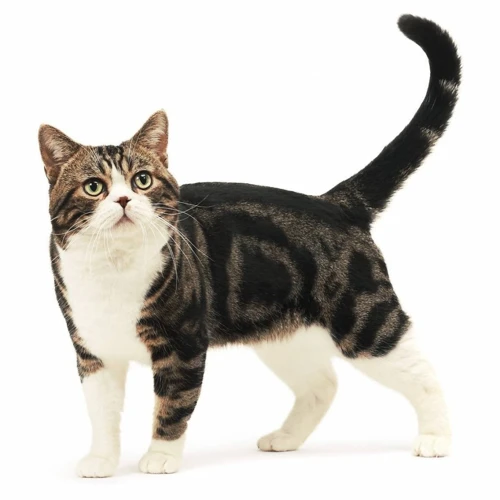
It’s essential to know the common vitamin deficiencies in American Wirehair Cats since they can significantly affect their health. Without the proper vitamins, cats can develop various health issues ranging from mild to life-threatening. It’s crucial to recognize the signs of vitamin deficiencies to keep your furry friend healthy and happy. Let’s dive deeper into the world of feline nutrition to explore the different types of vitamin deficiencies and their effects on American Wirehair Cats.
Vitamin A Deficiency
Vitamin A is an essential nutrient required for maintaining good vision, healthy skin, and a robust immune system in American Wirehair cats. A deficiency in Vitamin A can lead to significant health problems in your feline friend. It is vital to recognize the symptoms of Vitamin A deficiency to ensure that your cat gets the necessary treatment.
Symptoms of Vitamin A deficiency can be varied and may include poor vision, weight loss, and skin problems, among others. In extreme cases, it can even lead to blindness. Here is a table that illustrates some of the common symptoms associated with Vitamin A deficiency in American Wirehair cats.
| Symptoms of Vitamin A Deficiency | Description |
| Vison impairment | American Wirehair cats may experience impaired vision, particularly at night, due to lack of Vitamin A. |
| Poor coat and skin quality | A deficiency in Vitamin A can cause skin dryness, flakiness, and hair loss in American Wirehair cats. |
| Respiratory infections | American Wirehair cats may become prone to respiratory infections as they have a weakened immune system. |
| Weight loss | Cats with a Vitamin A deficiency may experience weight loss, which can lead to muscle weakness and lethargy. |
| Digestive problems | American Wirehair cats may have difficulty digesting and absorbing nutrients, leading to diarrhea and vomiting. |
If you suspect that your American Wirehair cat has a Vitamin A deficiency, it is crucial to consult a veterinarian immediately. The vet may prescribe a Vitamin A supplement or recommend a diet rich in Vitamin A to supplement any deficiencies.
Vitamin A deficiency in American Wirehair cats can lead to severe health issues that can be avoided with proper care and attention. Be sure to keep an eye out for symptoms of a deficiency and seek professional help if you notice any changes in your pet’s behavior or physical condition.
Vitamin B1 Deficiency
Vitamin B1, also known as Thiamine, is an essential nutrient required for maintaining a healthy metabolism in cats. A deficiency of this vitamin can be detrimental to an American Wirehair Cat’s health. Some of the symptoms of Vitamin B1 deficiency in cats include:
- Loss of appetite
- Weight loss
- Lethargy
- Weakness
- Neurological issues, including seizures
A lack of vitamin B1 can lead to an inadequate production of energy in the body, resulting in a metabolic disorder called “Beriberi.” This condition is more common in kittens because they have a higher requirement for thiamine than adult cats.
If left untreated, a Vitamin B1 deficiency can lead to severe and irreversible health problems, including heart failure and neurological damage. Prompt treatment is necessary to manage the symptoms of the deficiency.
There are a few different causes of Vitamin B1 deficiency in cats, including an inadequate diet, consumption of thiaminase-containing fish or shellfish, and an underlying medical condition that affects the body’s ability to absorb Thiamine.
Preventing Vitamin B1 Deficiency: To prevent Vitamin B1 deficiency in American Wirehair cats, it’s important to feed them a balanced diet that contains thiamine. You should always consult with a veterinarian or veterinary nutritionist when selecting a cat food that is nutritionally balanced.
If you suspect that your cat may be showing symptoms of a Vitamin B1 deficiency, it’s important to contact your veterinarian right away. Early diagnosis and treatment can help prevent more severe complications later on.
Vitamin B3 Deficiency
One of the common vitamin deficiencies in American Wirehair cats is a lack of Vitamin B3, also known as Niacin. This important vitamin plays a crucial role in maintaining a healthy nervous and digestive system, as well as promoting healthy skin and coat. Without enough niacin in their diet, cats can develop a range of health problems.
Here are some signs of Vitamin B3 Deficiency in American Wirehair cats:
- Weight Loss: Cats deficient in Vitamin B3 might experience weight loss or poor weight gain.
- Loss of Appetite: Your cat might not show any interest in their meals if they have a Vitamin B3 deficiency.
- Wounds and Injuries: Cats with this deficiency might take longer to heal from wounds or injuries.
- Behavioral Changes: Your cat might exhibit signs of anxiety and restlessness if they lack this important vitamin.
- Hyperkeratosis: This is when the skin on the nose and footpads becomes thickened and hard. American Wirehair cats with a Vitamin B3 deficiency are prone to this condition.
To prevent Vitamin B3 deficiency in your American Wirehair cat, make sure their diet includes ample amounts of niacin-rich foods like poultry, fish, and beef. Some cat foods are also fortified with Vitamin B3. If your cat is showing signs of deficiency, it is important to seek veterinary care to determine the best course of treatment and to avoid potential long term effects.
Vitamin D Deficiency
Vitamin D, commonly known as the “sunshine vitamin”, plays a critical role in calcium absorption and bone health. However, it also has other important functions in the body, like supporting a healthy immune system, reducing inflammation, and even promoting proper cell growth. A deficiency in this vitamin can cause serious health issues, especially for American Wirehair Cats.
Symptoms of Vitamin D Deficiency in Cats
The symptoms of vitamin D deficiency in American Wirehair Cats can be hard to spot initially. However, as the deficiency progresses, the following symptoms may become noticeable:
| Symptoms | Explanation |
|---|---|
| Poor growth in young cats | Vitamin D is essential for proper bone growth and development, so a deficiency in this nutrient can cause stunted growth in kittens |
| Soft or brittle bones | Without enough vitamin D, cats may not be able to properly absorb calcium. This can lead to weak, brittle bones that may break easily |
| Weak muscles | Vitamin D is also necessary for muscle function, so a deficiency can cause weakness and even muscle wastage in cats |
| Loss of appetite | Cats with vitamin D deficiency may lose their appetite or refuse food altogether |
| Lethargy | A deficiency in this critical nutrient can cause cats to become tired and lethargic, even if they’re getting enough sleep |
Causes of Vitamin D Deficiency in Cats
There are several reasons why American Wirehair Cats may develop a deficiency in vitamin D. Some of the most common causes include:
- Limited exposure to sunlight: Vitamin D is known as the “sunshine vitamin” for a reason. Cats that spend most of their time indoors or in shaded areas may not be getting enough sunlight to produce sufficient amounts of vitamin D.
- Inadequate diet: Some cat food brands may not contain enough vitamin D to meet the daily requirements of cats. This is especially problematic for American Wirehair Cats, as they may have specific nutritional needs that differ from other breeds.
- Underlying health issues: Some health conditions, like chronic renal disease or some types of cancer, can interfere with the body’s ability to absorb or use vitamin D.
Treatment and Prevention of Vitamin D Deficiency in Cats
If your American Wirehair Cat has been diagnosed with a vitamin D deficiency, there are several things you can do to help:
- Vitamin D supplements: Your veterinarian may recommend vitamin D supplements to help boost your cat’s levels of this critical nutrient. Supplements should only be given under the guidance of a veterinarian, as too much vitamin D can be toxic.
- High-quality diet: Feeding your cat a high-quality diet that contains sufficient amounts of vitamin D can help prevent deficiencies from developing.
- Supervised sun exposure: If your cat likes spending time outdoors, try to provide them with a supervised outdoor area where they can bask in the sun for a short period each day. However, it’s important to protect your cat’s skin from the sun by applying pet-safe sunscreen or providing a shaded area.
By understanding the importance of vitamin D for your American Wirehair Cat’s overall health and well-being, you can help ensure that they get the nutrition they need to thrive. If you suspect that your cat may be deficient in this vital nutrient, speak with your veterinarian as soon as possible to get their expert advice.
Vitamin E Deficiency
Vitamin E is an essential fat-soluble vitamin that plays a crucial role in maintaining the overall health of American Wirehair cats. A deficiency of this important vitamin can lead to various health issues that can be detrimental to the cat’s well-being.
Symptoms of Vitamin E Deficiency:
| Physical Symptoms | Behavioral Symptoms |
|---|---|
| Weakness and fatigue | Depression |
| Loss of appetite | Anxiety |
| Dizziness and disorientation | Aggression |
| Muscle tremors and spasms | Restlessness |
| Abnormal gait and posture | Excessive licking and grooming |
A deficiency of vitamin E can also lead to various medical conditions such as:
- Reproductive issues: Vitamin E deficiency can cause infertility, miscarriage, and difficult pregnancies in female cats.
- Muscular dystrophy: A deficiency of this vitamin can cause muscle degeneration and lead to chronic muscular dystrophy.
- Neurological issues: Vitamin E plays a key role in maintaining the nervous system. Its deficiency can result in neurological symptoms such as blindness, loss of coordination, and limb weakness.
It is important for American Wirehair cats to receive adequate amounts of vitamin E in their diet to maintain their health and overall well-being. Vitamin E can be found in various food sources such as fish, nuts, seeds, and vegetable oils. However, always consult with a veterinarian regarding the appropriate amount of vitamin E supplementation as excess amounts can be toxic and lead to adverse effects.
The Effects of Vitamin Deficiencies on American Wirehair Cats
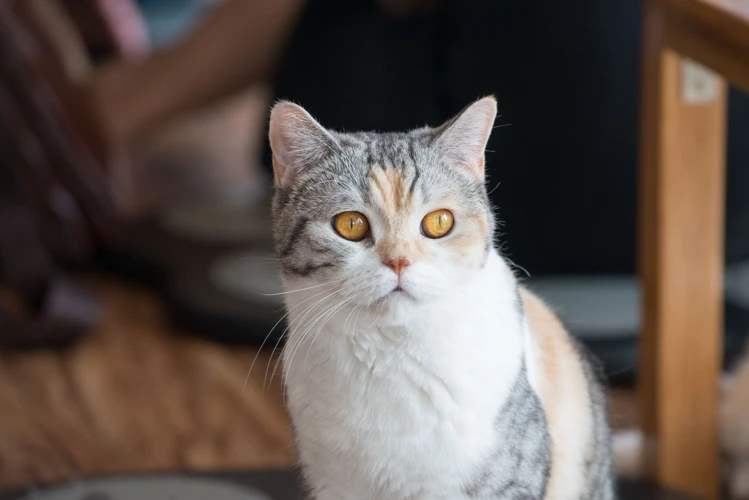
As with many living organisms, a lack of essential vitamins can have a detrimental impact on the health and wellbeing of American Wirehair cats. When the feline body lacks the necessary vitamins, various physiological processes are affected, leading to a wide range of issues such as weakened immune systems, skin problems, weight loss, and vision issues. In this section, we will explore the effects of vitamin deficiencies on American Wirehair cats in greater detail. Understanding these effects can help cat owners and caregivers identify signs of deficiency and take appropriate action to address them.
Poor Immune System
When American Wirehair cats suffer from vitamin deficiencies, their immune system can become compromised. This can lead to various health issues and make them more vulnerable to illnesses and infections. Some of the symptoms that may indicate a weakened immune system in cats include frequent infections, slow wound healing, and lethargy.
Vitamin deficiencies particularly affect the body’s ability to produce white blood cells, which play a vital role in fighting off infections and other illnesses. Without sufficient vitamins, the cat’s immune system may struggle to carry out its functions effectively.
Here are some of the vitamins that are crucial for a strong immune system in American Wirehair cats:
- Vitamin A: A deficiency in this vitamin can cause a decrease in the number of white blood cells in the body, which can impair the immune system. It can also lead to respiratory, gastrointestinal, and skin infections.
- Vitamin C: Although American Wirehair cats can synthesize vitamin C, a deficiency in this vitamin can cause a weakened immune system. It can also lead to slow healing of wounds and susceptibility to infections.
- Vitamin E: This vitamin is an important antioxidant that helps protect the immune system. A deficiency in this vitamin can make cats more prone to infections and other illnesses.
- Vitamin B6: This vitamin plays a role in the production of antibodies that fight infections. Without adequate B6, the immune system may not function properly.
It is important for American Wirehair cat owners to provide their pets with a well-balanced diet that includes all the essential vitamins. Feeding your cat a high-quality commercial cat food formulated to meet their nutritional needs is a good way to ensure they get all the essential vitamins they need for a strong immune system. Additionally, providing supplements is recommended. This should always be done in consultation with a veterinarian, as too much of some vitamins can be harmful to cats.
Regular veterinary check-ups are also important for preventing and identifying vitamin deficiencies in American Wirehair cats. If you suspect that your cat may be deficient in certain vitamins, take them to the vet as soon as possible. With proper care and attention, American Wirehair cats can lead healthy, vibrant lives.
Developmental Issues in Kittens
Kittens who experience vitamin deficiencies can suffer from developmental issues that can impact their growth and overall health. Some of the most common developmental issues that can be caused by vitamin deficiencies in American Wirehair kittens include:
- Bone Abnormalities: A lack of vitamin D can lead to improper bone development and abnormalities in kittens. This is because vitamin D helps the body absorb calcium, which is crucial for strong and healthy bones.
- Poor Muscle Development: Vitamin E is essential for proper muscle development in kittens, and a deficiency can lead to delayed muscle growth and weakness in kittens.
- Delayed Growth: Vitamin B1 is necessary for proper growth and development in kittens, and a deficiency can lead to delayed growth and development. This can lead to stunted growth and smaller body size in adult cats.
- Weak Immune System: Vitamins A and C are important for proper immune system function in kittens. A deficiency in these vitamins can lead to a weakened immune system, making kittens more susceptible to infections and illnesses.
It is crucial to provide kittens with a well-balanced diet that includes all necessary vitamins to ensure proper growth and development. Additionally, regular veterinary check-ups can help identify any potential deficiency issues early on, allowing for proper treatment and care to prevent any long-term developmental problems.
Weight Loss and Muscle Weakness
When a cat is deficient in certain vitamins, it can cause weight loss and muscle weakness. This is especially true for American Wirehair cats who may not be getting the necessary vitamins they need from their diet. A deficiency in vitamin B1 or thiamine can cause weight loss in cats, as it helps with the metabolism of carbohydrates and without it, the body struggles to utilize its energy properly.
Vitamin B12 is also crucial for maintaining healthy muscle and cell growth in felines. A deficiency in this vitamin may cause cats to experience muscle wasting or atrophy. This is due to the important role vitamin B12 plays in the production of DNA and RNA, which are necessary for the building and maintenance of muscle tissue.
In addition, vitamin D deficiency can lead to skeletal muscle weakness and atrophy. This is because vitamin D plays an important role in calcium absorption and maintaining strong bones and muscles. Without adequate amounts of vitamin D, cats can develop a condition called nutritional secondary hyperparathyroidism, which can cause muscle weakness, weight loss, and bone fractures.
It is important to note that weight loss and muscle weakness can also be symptoms of other underlying health issues, so it is important to consult a veterinarian if you notice these signs in your American Wirehair cat. By regularly providing high-quality cat food, as well as supplements as needed, you can help ensure your cat is receiving the necessary vitamins and nutrients to maintain a healthy weight and strong muscles.
Here is a table summarizing the essential vitamins for preventing weight loss and muscle weakness in American Wirehair cats:
| Vitamin | Role | Signs of Deficiency | Food Sources |
|---|---|---|---|
| Vitamin B1 (Thiamine) | Metabolism of carbohydrates | Weight loss, decreased appetite, muscle weakness | Fortified cat food, liver, pork, poultry, fish |
| Vitamin B12 | Cell growth and maintenance of muscle tissue | Muscle wasting or atrophy, weakness | Meat, fish, dairy, fortified cat food |
| Vitamin D | Calcium absorption and maintenance of strong bones and muscles | Muscle weakness and atrophy, bone fractures | Sunlight, fortified cat food, fatty fish, liver |
Remember, maintaining a balanced and nutritious diet is essential for preventing vitamin deficiencies in American Wirehair cats and keeping your pet healthy.
Skin and Coat Problems
Skin and coat problems are a common effect of vitamin deficiencies in American Wirehair Cats. The lack of essential vitamins such as Vitamin A, B, and E can cause a plethora of issues. Here are some possible skin and coat problems that can arise due to vitamin deficiencies:
- Dull Coat: Vitamin B7, also known as biotin, is essential for maintaining a healthy coat. Biotin deficiency may cause hair loss and dullness of coat in cats.
- Dry Skin: Vitamin E helps to maintain healthy skin by moisturizing it from within. A deficiency of Vitamin E may cause dry and flaky skin in cats.
- Folliculitis: Vitamin A is required for the proper functioning of oil glands in the skin. Its deficiency can cause a condition called folliculitis where the hair follicles become inflamed.
- Greasy Coat: A deficiency of Vitamin A can cause sebaceous oil gland imbalance. This may cause a greasy coat with an unpleasant odor.
In addition to the above-listed problems, cats with Vitamin deficiencies may also develop skin allergies and fungal infections that can further damage their skin and coat. Hence, it is crucial to provide your cat with a proper diet that includes all the essential vitamins and minerals necessary for maintaining healthy skin and coat. Consulting with a veterinarian can also be helpful in determining any underlying issues or imbalances that may be causing skin and coat problems.
Eye and Vision Issues
Cats rely heavily on their sense of sight, and vitamin deficiencies can seriously impair their vision. Vitamin A is especially important for maintaining good eye health. American Wirehair cats deficient in this particular vitamin can develop a condition called nyctalopia, colloquially known as night blindness. This makes it challenging for your cat to see in low-light conditions, and they may become frightened, disoriented, or struggle to locate their litter box in the dark.
In addition to night blindness, a vitamin E deficiency can also cause vision problems in American Wirehair cats. This can cause damage to the retinas, the part of the eye responsible for detecting light. If left untreated, it could lead to irreversible vision loss.
To prevent vision issues, it’s crucial to provide your American Wirehair cat with a balanced diet rich in vitamin A and E. Foods high in these vitamins include fortified cat food, liver, fish, milk, and eggs. Alternatively, high-quality supplements may be administered under the guidance of your veterinarian.
Keep a close eye on your American Wirehair cat for any signs of vision impairment such as squinting, dilated pupils, or clumsiness when navigating narrow spaces in low-light conditions. Regular veterinary check-ups can help detect and treat vitamin deficiencies early on, preventing any irreversible damage to their eyesight. Remember, providing your cat with a healthy, balanced diet and supplements can go a long way in maintaining their vision and overall well-being.
Dental Problems
Cats with vitamin deficiencies may also experience a range of dental problems that can significantly impact their quality of life. One of the most common dental issues seen in American Wirehair cats with vitamin deficiencies is periodontal disease. This is a bacterial infection that affects the gums and causes inflammation, redness, and bleeding. If left untreated, it can lead to tooth decay, bone loss, and even tooth loss.
Cats with vitamin deficiencies may also experience problems with tooth enamel, which can cause their teeth to become brittle and prone to fractures. This can lead to discomfort, pain, and difficulty eating, which can affect their overall health and well-being.
To prevent these dental problems, it is important to ensure that your American Wirehair cat is getting enough vitamins and minerals in their diet. This can be achieved by feeding them a balanced and high-quality cat food that contains a good mix of essential nutrients.
It is also important to provide your cat with regular dental check-ups and cleanings to prevent the buildup of plaque and tartar. Additionally, cat owners can give their furry friends dental treats and toys to promote healthy teeth and gums.
If you notice any signs of dental problems in your American Wirehair cat, such as bad breath, bleeding gums, or difficulty eating, it is important to seek veterinary care immediately. Your vet can help diagnose and treat any underlying vitamin deficiencies and dental issues, ensuring that your cat remains healthy and happy for years to come.
Preventing Vitamin Deficiencies in American Wirehair Cats
As a responsible American Wirehair cat owner, it’s important to ensure that your furry companion is receiving all the essential vitamins to maintain a healthy and happy life. Prevention is always better than cure when it comes to vitamin deficiencies in cats, so taking steps to ensure that your cat is receiving all the necessary nutrients is essential. Here are some effective prevention methods that every cat owner should know to prevent vitamin deficiencies in American Wirehair cats.
High-Quality Cat Food
To prevent vitamin deficiencies in American Wirehair Cats, providing high-quality cat food is crucial. The best cat food for American Wirehair Cats is one that is rich in essential vitamins and minerals.
What makes high-quality cat food?
High-quality cat food should meet the nutritional requirements set out by the Association of American Feed Control Officials (AAFCO). It should ideally consist of quality protein, carbohydrates, and fats in the correct amounts. You should avoid cat food that contains artificial preservatives, colors, or flavors.
The table below shows the essential vitamins and minerals that should be present in high-quality cat food and their benefits.
| Vitamins and Minerals | Benefits |
|---|---|
| Vitamin A | Keeps your cat’s immune system healthy and promotes vision health |
| Vitamin B1 | Helps maintain a healthy nervous and digestive system. A deficiency can lead to a loss of appetite, vomiting, and weight loss. |
| Vitamin B3 | Essential for energy metabolism, skin health and helps maintain a healthy nervous system. A deficiency can lead to loss of appetite, vomiting, and diarrhea. |
| Vitamin D | Key for bone health, metabolism, and helps regulate calcium levels in the blood. A deficiency can cause rickets in kittens and lead to bone deformities and weakness in adult cats. |
| Vitamin E | Protects your cat’s cells from oxidative damage and helps boost the immune system. A deficiency can cause muscle weakness and impaired vision |
| Calcium | Important for strong bones, healthy muscle function. A deficiency can lead to bone deformities and muscle weakness |
| Phosphorus | Involved in energy metabolism and helps make up bones and teeth. Too much phosphorous can lead to kidney problems in cats with underlying kidney disease. |
In addition to vitamins and minerals, high-quality cat food should also contain essential fatty acids like omega-3 and omega-6, which help keep your cat’s coat looking healthy and shiny. DHA is also essential for cognitive function and should be included in kitten diets for optimal brain development.
By providing your American Wirehair Cat with high-quality cat food, you help prevent vitamin deficiencies and keep your cat healthy and happy. It is essential to consult with your veterinarian to make sure your cat’s nutritional requirements are being met and to determine the best diet for your cat.
Supplements
Giving your American Wirehair cat dietary supplements can be an effective way to ensure they are receiving all the vitamins and nutrients they need. However, it’s important to understand which supplements are appropriate and how much to give.
1. Omega-3 Fatty Acids: Supplementing your cat’s diet with Omega-3 fatty acids from fish oil can provide many health benefits, from promoting a healthy skin and coat to reducing inflammation. Studies have also shown that adding Omega-3 to a cat’s diet can help prevent heart disease and reduce the risk of cancer. Consult with your veterinarian to determine the appropriate dosage.
2. Vitamin D: While it’s important to avoid over-supplementing Vitamin D, adding small amounts to your American Wirehair’s diet can promote healthy bone growth and enhance their immune system. Vitamin D can also decrease the risk of certain types of cancer. Your veterinarian can advise how much Vitamin D is appropriate for your cat’s individual needs.
3. Probiotics: Probiotics can help maintain a healthy digestion system and strengthen your cat’s immune system. They can also aid in the absorption of other important nutrients. Be sure to choose a probiotic specifically designed for cats and follow the recommended dosage.
4. Vitamin B12: This vitamin is essential for healthy nerve function and helps with digestion and metabolism. A Vitamin B12 deficiency can lead to anemia and weight loss. While high-quality cat food will typically provide enough Vitamin B12, some cats may require supplements. Consult with your veterinarian to determine if your American Wirehair needs additional Vitamin B12.
5. Multivitamins: While it’s not necessary to give your cat a daily multivitamin if they are already receiving a balanced diet, a multivitamin can serve as a safety net in case they are missing any vital vitamins or minerals. Similar to Vitamin B12, high-quality cat food should provide all necessary vitamins, but supplements can be added if recommended by a veterinarian.
Remember, it’s crucial to consult with a veterinarian before giving your American Wirehair any supplements. Over-supplementation can lead to toxicity and cause harm to your pet. Additionally, always choose high-quality supplements specifically designed for cats and follow the recommended dosage.
Regular Veterinary Check-Ups
Regular veterinary check-ups are essential to maintaining the health and well-being of American Wirehair cats. During these visits, a veterinarian can perform a physical examination, identify potential health problems, and recommend preventive measures to keep your cat healthy.
The Importance of Regular Veterinary Check-Ups
Cats are masters at hiding their illnesses and discomfort. They may seem perfectly healthy but have an underlying health condition that could become more severe if left untreated. Regular veterinary check-ups can help catch these issues early on, increasing the chances of successful treatment.
During these check-ups, the veterinarian may perform a physical exam to look for signs of illness. They may also recommend bloodwork to screen for vitamin deficiencies or other medical conditions.
Recommended Frequency
The frequency of veterinary check-ups largely depends on the age of the cat. Young kittens require more frequent visits, while healthy adult cats may only need annual check-ups.
Generally, kittens should be seen by a veterinarian at least once a month until they are three months old. After that, they should receive a check-up every three to six months until they are a year old.
Adult cats over a year old should receive annual check-ups. Senior cats, over the age of seven, may benefit from check-ups every six months. This is because older cats are more susceptible to diseases, and regular check-ups can help identify and treat these diseases early on.
Cost of Veterinary Check-Ups
The cost of veterinary check-ups varies depending on the location, the veterinarian, and the services provided. However, the cost of regular check-ups is significantly lower than the cost of treating a serious illness or injury that could have been prevented through regular check-ups.
Many pet insurance plans cover the cost of regular check-ups, making it more affordable for pet owners to maintain their cat’s health.
Conclusion
Regular veterinary check-ups are an essential part of keeping your American Wirehair cat healthy. They allow for early detection of health issues, which can lead to more successful treatments and a better quality of life for your cat. By scheduling annual or bi-annual check-ups, cat owners can ensure their furry friends receive the best possible care.
| Benefit of Regular Veterinary Check-Ups | Recommended Frequency | Approximate Cost |
|---|---|---|
| Early detection of health issues | Annual for adult cats, every 6 months for senior cats | Varies depending on location and services provided, often covered by pet insurance |
| Identification of potential health problems | Monthly for kittens until 3 months old, then every 3-6 months until 1 year old | |
| Recommendations for preventive measures |
Avoiding Human Food
It’s a common misconception that human food is safe for pets to consume. However, feeding your American Wirehair cat with human food can lead to serious health problems. Certain human foods are known to be toxic and can even be fatal to cats. To ensure the health and wellbeing of your furry friend, it’s essential to avoid giving them human food altogether.
Below, we’ve created a table to highlight some of the most harmful foods for cats:
| Foods to Avoid | Reasons to Avoid |
|---|---|
| Chocolate | Contains theobromine which is toxic and can cause rapid heart rate, tremors, seizures and even death in cats. |
| Caffeine | Similar to chocolate, caffeine has the potential to cause vomiting, diarrhea, muscle tremors, rapid breathing and heart palpitations in cats. |
| Garlic and Onion | Eating these foods can result in damage to cats’ red blood cells, leading to anemia or even death. |
| Grapes and Raisins | Although the exact mechanism is still unknown, grapes and raisins are known to cause kidney damage in cats. |
| Avocado | Avocados contain persin, which can lead to stomach upset, vomiting and diarrhea in cats. |
| Fatty Foods and Bones | Foods high in fat can cause upset stomach, while bones can splinter and cause blockages or lacerations in the digestive tract. |
Remember, always read the ingredients list of commercially available cat food before purchasing it, to ensure that it doesn’t contain any of the harmful ingredients mentioned above. Avoiding human food entirely is the best way to prevent any potential harm to your feline friend.
Conclusion
In conclusion, it’s clear that vitamin deficiencies in American Wirehair cats can have serious consequences on their health. As with any animal, proper nutrition is essential for these cats to reach optimal health. Therefore, it’s crucial that cat owners pay close attention to the nutritional needs of their pets.
Cats require both water-soluble and fat-soluble vitamins to remain healthy, and the most common vitamin deficiencies in American Wirehair cats are vitamins A, B1, B3, D, and E. These deficiencies can affect various aspects of a cat’s health, from their immune system and vision to their coat and teeth.
Fortunately, preventing vitamin deficiencies is possible through a combination of factors, including a high-quality diet, supplements, regular veterinary check-ups, and avoiding human food. By taking these precautions, cat owners can ensure their American Wirehair cats remain in the best possible health and avoid any complications associated with vitamin deficiencies.
In summary, while vitamin deficiencies in American Wirehair cats can be serious, they can also be prevented with proper nutrition and care. By being mindful of a cat’s dietary needs and providing them with the necessary vitamins and minerals, cat owners can ensure their pets are happy, healthy, and thrive.
Frequently Asked Questions
1. What is the role of water-soluble vitamins in American Wirehair cats?
Water-soluble vitamins help maintain healthy skin and coat, assist with the functioning of the immune system and metabolism, and aid in the production of red blood cells.
2. What are the sources of Vitamin A for American Wirehair cats?
Good sources of Vitamin A for American Wirehair cats include liver, dairy products, and fish.
3. Can a lack of Vitamin E cause digestive issues in American Wirehair cats?
Yes, a deficiency of Vitamin E can cause digestive issues, muscle weakness, and poor immune function in American Wirehair cats.
4. How can I tell if my American Wirehair cat has a Vitamin B1 deficiency?
Symptoms of a Vitamin B1 deficiency in American Wirehair cats include weight loss, decreased appetite, and muscle weakness.
5. Is Vitamin D important for the bone health of American Wirehair cats?
Yes, Vitamin D plays a crucial role in maintaining healthy bones in American Wirehair cats.
6. What are some signs of a Vitamin E deficiency in American Wirehair cats?
American Wirehair cats with a Vitamin E deficiency may experience muscle weakness, vision problems, and poor immune function.
7. Can a diet lacking in Vitamin B3 cause skin issues in American Wirehair cats?
Yes, a diet deficient in Vitamin B3 can cause skin issues like redness, dryness, and lesions in American Wirehair cats.
8. Can Vitamin A toxicity occur in American Wirehair cats?
Yes, excessive consumption of Vitamin A can lead to toxicity in American Wirehair cats, which can cause bone and joint pain, vomiting, and anorexia.
9. Is it safe to give my American Wirehair cat vitamin supplements?
It’s important to consult with a veterinarian before giving your American Wirehair cat any vitamin supplements, as too much of certain vitamins can be harmful.
10. How can I incorporate high-quality sources of vitamins in my American Wirehair cat’s diet?
Include foods like lean meats, fish, organ meats, and eggs as well as vegetables like carrot, spinach, broccoli, and sweet potato to provide ample amounts of vitamins in your American Wirehair cat’s diet.

